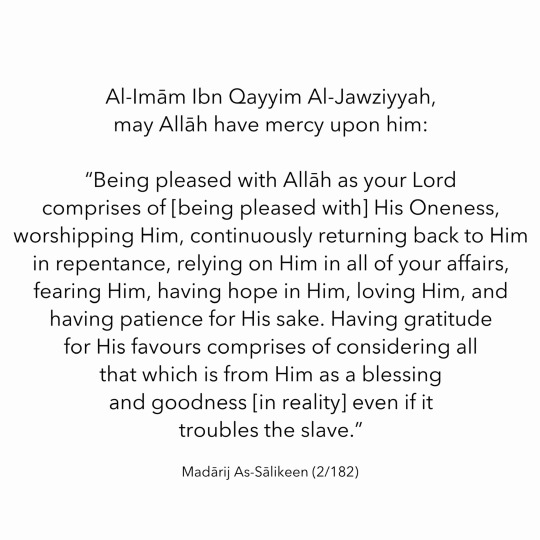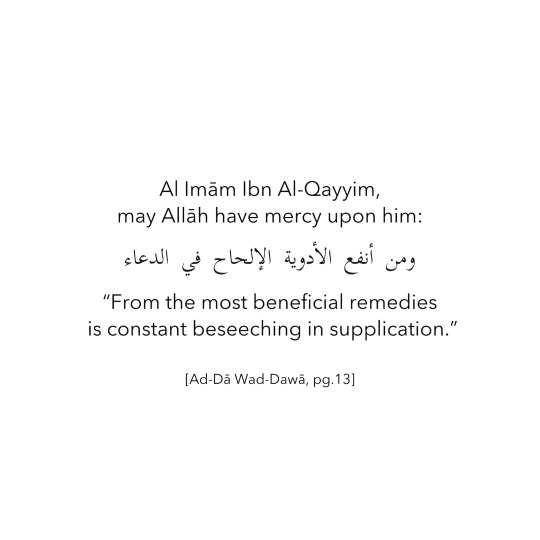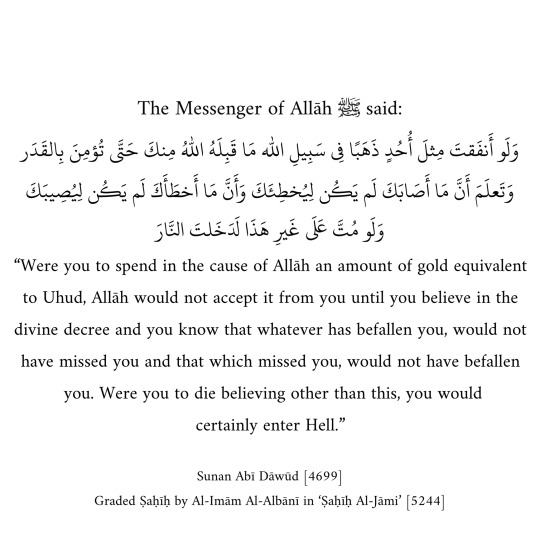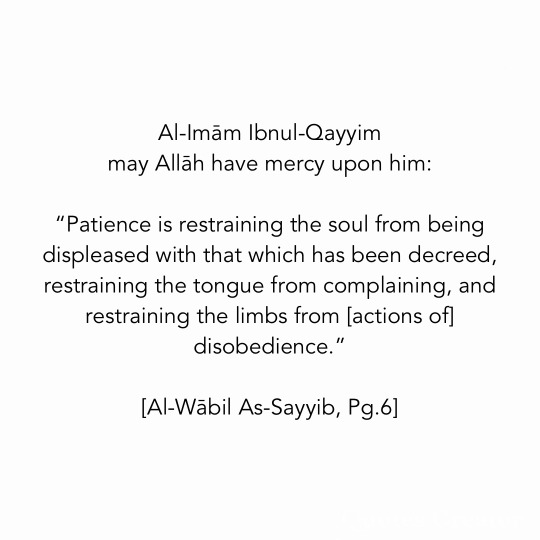Text
:قال إبراهيم ابن أدهم رحمه الله تعالى
لو علِم الملوك وأبناء الملوك ما نحن فيه من النعيم والسرور لجالدونا بالسيوف.
[(تاريخ دمشق (٦/٣٦٦]
Ibrahīm Ibn Adham, may Allāh have mercy upon him, said:
“If the kings and their sons knew what we experience of tranquility and happiness, they would fight us for it with their swords.”
Tārīkh Ad-Dimashq (6/366)
37 notes
·
View notes
Text

قال الإمام عبد الرحمن بن ناصر السعدي رحمه الله تعالى:
فإن العبد إذا أصابته مصيبة فصبر وثبت، ازداد بذلك إيمانه، ودل ذلك على أن استمرار الجزع مع العبد دليل على ضعف إيمانه.
[ تفسير السعدي | سورة القصص، آية ١٠]
Al-Imām ‘Abdur-Raḥmān ibn Nāṣir As-Si’dī, may Allāh have mercy upon him:
“Verily, if a calamity befalls the slave and he is patient and stays firm, his Īmān increases, and this proves that the slave constantly being in a state of worry is a sign of the weakness of his Īmān.”
[Tafsīr As-Si’dī, Surah Al-Qaṣaṣ (10)]
40 notes
·
View notes
Text

رضيت بالله ربًّا
:قال ابن قيم الجوزية رحمه الله تعالى
الرضا به ربًّا يتضمن توحيده، وعبادته، والإنابة إليه، والتوكل عليه، وخوفه، ورجاءه، ومحبته، والصبر له به. والشكر على نعمه: يتضمن رؤية كل ما منه نعمةً وإحسانًا، وإن ساء عبده
[مدارج السالكين، ٢/١٨٢]
Al-Imām Ibn Qayyim Al-Jawziyyah, may Allāh have mercy upon him:
“Being pleased with Allāh as your Lord comprises of [being pleased with] His Oneness, worshipping Him, continuously returning back to Him in repentance, relying on Him in all of your affairs, fearing Him, having hope in Him, loving Him, and having patience for His sake. Having gratitude for His favours comprises of considering all that which is from Him as a blessing and goodness [in reality] even if it troubles the slave.”
Madārij As-Sālikeen (2/182)
22 notes
·
View notes
Text

قال ابن القيم رحمه الله تعالى:
ومن أنفع الأدوية الإلحاح في الدعاء
[الداء والدواء, ص١٣]
Al-Imām Ibn Al-Qayyim, may Allāh ﷻ have mercy upon him:
“From the most beneficial remedies is constant beseeching in supplication.”
[Ad-Dā Wad-Dawā, pg.13]
27 notes
·
View notes
Text
الدعاء المستجاب
:عن أنس بن مالك رضي الله عنه قال: قال رسول الله ﷺ
«الدُّعَاءُ لَا يُرَدُّ بَينَ الْأَذَانِ وَالْإِقَامَة»
[صححه الإمام الألباني رحمه الله في 'إرواء الغليل' ،٢٤٤]
Anas ibn Mālik raḍhiyāllahu ‘anhu narrated that The Prophet ﷺ said:
“The du’ā between the adhān and the iqāmah is not rejected.”
[Graded Ṣaḥīḥ by Al-Imām Al-Albānī in ‘Irwā Al-Galīl, No.244]
#حديث الرسول#حديث رسول الله ﷺ#رسول الله صلى الله عليه وسلم#حديث نبوي#السنة النبوية#أهل السنة#salafiyyah#سلفي#manhaj salaf#sunnah#islam#islamic post#islamic knowledge
1 note
·
View note
Text
مطيع لله في الصيام والفطر
:قال ابن رجب الحنبلي رحمه الله تعالى
فالصائم ترك شهواتِه لله بالنهار تقرُّبًا إليه وطاعةً له، وبادرَ إليها في الليل تقرُّبًا إليه وطاعةً له، فما تركَها إلَّا بأمر ربِّه ولا عاد إليها إلَّا بأمر ربِّه؛ فهو مُطيع له في الحالين.
[لطائف المعارف ص٢٩٣]
Al-Imām Ibn Rajab Al-Ḥanbaliyy, raḥimahullāh:
“The fasting person abandons his desires (i.e. eating, drinking, and sexual intercourse) for Allāh during the day, in order to seek closeness to Him and in obedience to Him, and he hastens to these desires at night seeking closeness to Him and in obedience to Him, so he does not abandon his desires except by the command of his Lord and he does not return to them except by the command of his Lord, so he is obedient to Him in both states.”
[Laṭāif Al-Ma’ārif, pg.293]
#islamic quotes#salafiyyah#islam#manhaj salaf#sayings of the salaf#sunnah#أقوال السلف#آثار السلف#islamic post#islamic knowledge#ibn rajab#ابن رجب#رمضان#شهر رمضان#رمضان مبارك#ramadhan
4 notes
·
View notes
Text
:قال الإمام ابن رجب الحنبلي رحمه الله
سلامة الصدور من الرياء والغل، والحسد والغش والحقد، وتطهيرها من ذلك أفضل من التطوع بأعمال الجوارح. وكثرة أعمال الجوارح مع تدنيس القلب بشيء من هذه الأوضار لا يزكو؛ وهو كزرع في أرض كثيرة الآفات لا يكاد يسلم ما ينبت فيها.
مجموع رسائل ابن رجب ٣٥٥/١
Al-Imām Ibn Rajab Al-Ḥanbaliyy, raḥimahullāh:
"The soundness of the heart from showing off, hatred, envy, deception, malice and purifying it from these matters is more virtuous than performing voluntary acts upon the limbs. Abundant actions of the limbs whilst the heart is defiled with any of these impure characteristics does not cause the heart to become pure; it is like planting in a land full of pests, hardly anything that grows in it is safe."
[Majmū’ Rasāil Al-Ḥāfiz Ibn Rajab Al-Ḥanbaliyy (1/355)]
3 notes
·
View notes
Text

:قال الإمام ابن القيم رحمه الله
إنَّ العبد لا يزال يرتكب الذنب، حتَّى يهون عليه، ويصغر في قلبه. وذلك علامة الهلاك، فإنَّ الذنب كلَّما صغُر في عين العبد عظُم عند الله.
[الداء والدواء، ص ١٤٤]
Al-Imām Ibnul-Qayyim, raḥimahullāh, said:
“Verily the servant continues to commit a sin, until it becomes insignificant to him and it becomes small in his heart. This is a sign of destruction, for whenever the sin is small in the eyes of the servant, the greater it is with Allāh.”
[Ad-Dā Wad-Dawā, pg.144]
#islamic quotes#salafiyyah#islam#manhaj salaf#sayings of the salaf#islamic post#أقوال السلف#آثار السلف#ابن القيم#الداء والدواء#الذنوب
3 notes
·
View notes
Text

“If the slave knew the purposes of the divine decree, he would cry because of his bad thoughts of Allāh.”
30 notes
·
View notes
Text
Al-Qadr (The Divine Decree)

It is reported by Aḥmed, Abū Dāwūd, and Ibn Mājah in their books of aḥādīth that Ibn Ad-Daylamiyy (one of the senior tābi’ee) narrated:
“I came to Ubayy ibn K’ab (may Allāh be pleased with him) and said:
‘There has occurred to me some confusion pertaining to the qadr (divine decree) so tell me something by means of which Allāh may remove this confusion from my heart.’ Ubayy ibn K’ab replied:
لَو أَنَّ اللهَ عَذَّبَ أَهلَ سَمَاوَاتِهِ وَأَهلَ أَرضِهِ عَذَّبَهُم وَهُوَ غَيرُ ظَالِمٍ لَهُم
‘If Allāh were to punish everyone in the heavens and in the earth, He would do so without being unjust to them,
وَلَو رَحِمَهُم كَانَتْ رَحمَتُهُ خَيرًا لَهُم مِن أَعمَالِهِم
and were He to show mercy to them, His mercy would be much better for them than their actions.
وَلَو أَنفَقتَ مِثلَ أُحُدٍ ذَهَبًا فِي سَبِيلِ اللهِ مَا قَبِلَهُ اللهُ مِنكَ حَتَّى تُؤْمِنَ بِالقَدَرِ
Were you to spend in the cause of Allāh an amount of gold equivalent to Uhud, Allāh would not accept it from you until you believe in the divine decree,
وَتَعلَمَ أَنَّ مَا أَصَابَكَ لَم يَكُن لِيُخطِئَكَ
and you know that whatever has befallen you, would not have missed you,
وَأَنَّ مَا أَخطَأَكَ لَم يَكُن لِيُصِيبَكَ
and that which missed you, would not have befallen you.
وَلَو مُتَّ عَلَى غَيرِ هَذَا لَدَخَلتَ النَّارَ
Were you to die believing other than this, you would certainly enter Hell.’
He (i.e. Ibn Ad-Daylamiyy) said, ‘Thereafter, I went to ‘Abdullāh Ibn Masu’ūd and he said the same. Then I went to Ḥuzayfah Ibn Al-Yamān and he said the same. Then I went to Zayd Ibn Thābit and he narrated to me from the Prophet ﷺ the same.”
Graded Ṣaḥīḥ by Al-Imām Al-Albānī in Ṣaḥīḥ Al-Jāmi’ [5244]
24 notes
·
View notes
Text
On the authority of ‘Abdullāh ibn ‘Umar, may Allāh be pleased with them both, reported:
The Messenger of Allāh ﷺ took me by my shoulder and said:
« كُن فِي الدُّنيَا كَأَنَّكَ غَرِيبٌ أَو عَابِرُ سَبِيل »
“Be in this world as if you are a stranger or a wayfarer.”
[Ṣaḥīḥ Al-Bukhārī 6416]
وَكَانَ ابن عُمَرَ يَقُولُ : إِذَا أَمسَيتَ فَلَا تَنتَظِرِ الصَّبَاحَ، وَإِذَا أَصبَحتَ فَلَا تَنتَظِرِ الْمَسَاءَ، وَخُذْ مِن صِحَّتِكَ لِمَرَضِكَ، وَمِن حَيَاتِكَ لِمَوتِكَ.
Ibn ‘Umar (رضي الله عنهما) used to say: “When you survive till the evening, do not expect to live until the morning; and when you survive till the morning, do not expect to live until the evening; Take [advantage of] your health before times of sickness, and [take advantage of] your life before your death.”
#حديث رسول الله ﷺ#رسول الله صلى الله عليه وسلم#حديث صحيح#حديث نبوي#سنة النبوي#صحيح البخاري#islamic quotes#salafiyyah#islam#manhaj salaf#sayings of the salaf#sunnah#آثار السلف#أقوال السلف#islamic post#islamic knowledge#sahih bukhari#hadith sahih#dunya#الدنيا#الإسلام#الإيمان
9 notes
·
View notes
Text

عامل الناس بما تحب أن يعاملوك به
On the authority of ‘Abdullāh Ibn ‘Amr, may Allāh be pleased with them, that The Messenger of Allāh ﷺ said:
فَمَن أَحَبَّ أَن يُزحزَحَ عَنِ النَّار وَيُدخَلَ الجَنَّةَ»
“Whoever loves to be saved from the fire and entered into Paradise,
فَلْتَأتِهِ مَنِيَّتُه وَهُوَ يُؤمِن بِاللهِ وَاليَومِ الآخِرِ
then let him die whilst he believes in Allāh and the last day
«ولْيَأتِ إِلَى النَّاسِ الَّذِي يُحِبُّ أن يُؤتَى إِلَيهِ
[صحيح مسلم ١٨٤٤]
and let him treat the people as he would like to be treated.”
Ṣaḥīḥ Muslim (1844)
-
:قال الحافظ النووي رحمه الله
هذه قاعدة مهمة فينبغي الاعتناء بها، وأن الإنسانَ يلزَم ألَّا يفعل مع الناس إلا ما يحب أن يفعلوه معه
[المنهاج (١٢/٣٢٣)]
Al-Hāfidh An-Nawawī, may Allāh have mercy upon him:
“This is an important principle that should be given consideration; it is imperative that a person should not deal with the people except in a manner he would love that they deal with him.”
Al-Minhāj (12/323)
38 notes
·
View notes
Text
فتنة هذه الأمة
عن كعب بن عياض رضي الله عنه قال سمعت النبي ﷺ يقول
«.إِنَّ لِكُلِّ أُمَّةٍ فِتنَة وَفِتنَةُ أُمَّتِي الْمَال»
رواه الترمذي (٢٣٣٦) وحسنه الإمام الوادعي في 'الصحيح المسند' (١٠٩٣)، وصححه الإمام الألباني في 'السلسلة الصحيحة' (٥٩٢).
On the authority of Ka’b Ibn ‘Iyāḍh, may Allāh be pleased with him, who said: I heard The Prophet ﷺ say:
“Verily, for every nation there is a fitnah (trial) and the trial of my nation is wealth.”
Reported by At-Tirmidhī (2336).
Graded Ḥasan by Al-Imām Muqbil Al-Wādi’ī in Aṣ-Ṣaḥīḥ Al-Musnad (No. 1093) and Ṣaḥīḥ by Al-Imām Al-Albānī in As-Silsilah Aṣ-Ṣaḥīḥah (No. 592).
#حديث صحيح#حديث نبوي#حديث رسول الله ﷺ#السنة النبوية#أهل السنة#السنة#islamic quotes#salafiyyah#islam#manhaj salaf#sayings of the salaf#sunnah#أقوال السلف#آثار السلف#islamic post#islamic knowledge#islamicposts#الإسلام#أحاديث نبوية#hadith#salaf#islamicreminders
3 notes
·
View notes
Text
:قال الإمام ابن رجب الحنبلي رحمه الله
سلامة الصدور من الرياء والغل، والحسد والغش والحقد، وتطهيرها من ذلك أفضل من التطوع بأعمال الجوارح. وكثرة أعمال الجوارح مع تدنيس القلب بشيء من هذه الأوضار لا يزكو؛ وهو كزرع في أرض كثيرة الآفات لا يكاد يسلم ما ينبت فيها.
مجموع رسائل ابن رجب ٣٥٥/١
Al-Imām Ibn Rajab Al-Ḥanbaliyy, raḥimahullāh:
"The soundness of the heart from showing off, hatred, envy, deception, malice and purifying it from these matters is more virtuous than performing voluntary acts upon the limbs. Abundant actions of the limbs whilst the heart is defiled with any of these impure characteristics does not cause the heart to become pure; it is like planting in a land full of pests, hardly anything that grows in it is safe."
[Majmū’ Rasāil Al-Ḥāfiz Ibn Rajab Al-Ḥanbaliyy (1/355)]
#islamic quotes#salafiyyah#islam#manhaj salaf#sayings of the salaf#sunnah#أقوال السلف#آثار السلف#islamic post#islamic knowledge#salafi#ابن رجب#الإسلام#الإمام النووي#الإيمان#حسن الخلق#صحة القلب#أمراض القلوب#good character#pure heart
3 notes
·
View notes
Text
القلب السليم
:قال الإمام ابن رجب الحنبلي رحمه الله
فالقلب سليم: هو الذي ليس فيه شيء من محبة ما يكرهه الله، فدخل في ذلك سلامته من الشرك الجلي والخفي، ومن الأهواء والبدع، ومن الفسوق والمعاصي - كبائرها وصغائرها - الظاهرة والباطنة، كالرياء، والعجب، والغل، والغش، والحقد، والحسد وغير ذلك. وهذا القلب السليم هو الذي لا ينفع يوم القيامة سواه
[مجموع رسائل الحافظ ابن رجب الحنبلي (٣٥٥/١)]
Al-Imām Ibn Rajab Al-Ḥanbaliyy, may Allāh have mercy upon him:
“The heart which is sound: it is the one in which there is no love in it for that which Allāh hates, included in this is the heart being free from manifest and hidden shirk (polytheism), [evil] desires, innovations, immorality, sins - major and minor - apparent and hidden, such as showing off, vanity, hatred, deception, malice, envy, etc. and this sound heart, nothing will be of benefit on the Day of Resurrection except it.”
[Majmū’ Rasāil Al-Ḥāfiz Ibn Rajab Al-Ḥanbaliyy (1/355)]
#islamic quotes#salafiyyah#islam#manhaj salaf#sayings of the salaf#sunnah#أقوال السلف#آثار السلف#islamic post#islamic knowledge#ibn rajab#تزكية النفس#صحة القلب#القلب#أمراض القلوب#ابن رجب#الحكمة#الحسد#الإسلام#التوحيد#أعمال القلوب
6 notes
·
View notes
Text

:قال الإمام ابن القيم رحمه الله تعالى
الصبر : حبس النفس عن التسخط بالمقدور، وحبس اللسان عن الشكوى، وحبس الجوارح عن المعصية
[الوابل الصيب ص٦]
Al-Imām Ibnul-Qayyim, may Allāh have mercy upon him:
“Patience is restraining the soul from being displeased with that which has been decreed, restraining the tongue from complaining, and restraining the limbs from [actions of] disobedience.”
[Al-Wābil As-Sayyib, Pg.6]
19 notes
·
View notes
Text
فائدة جميلة
{عَسَى أن تَكرَهُوا شَيئًا وَهُوَ خَيرٌ لَكُم وَعَسَى أن تُحِبُّوا شَيئًا وَهُوَ شَرٌّ لَكُم}
:قال الإمام ابن القيم رحمه الله تعالى
فمن صحَّت له معرفةُ ربه والفقه في أسمائه وصفاته؛ علِمَ يقينًا أنَّ المكروهات التي تُصيبه والمِحَن التي تنزل به فيها ضروب من المصالح والمنافع التي لا يُحصيها علمُه ولا فِكرتُه، بل مصلحة العبد فيما يكره أعظم منها فيما يُحب؛ فعامةُ مصالح النفوس في مكروهاتها؛ كما أنَّ عامةَ مَضارِّها وأسباب هلكتها في محبوباتها.
[الفوائد، ص١٣٣]
Al-Imām Ibnul-Qayyim raḥimahullāh said:
“Whoever has sound knowledge of his Lord and understanding of His names and attributes, will know with certainty that the adversities which befall him and the trials which he is afflicted with have various benefits which his knowledge cannot comprehend. Rather, the servant’s interest in that which he hates is greater than in that which he loves; thus the general interests of the soul are in that which it dislikes, just as the general harms and the causes of it’s destruction are in that which it desires.”
[Al-Fawāid, pg.133]
#islamic quotes#salafiyyah#islam#manhaj salaf#sayings of the salaf#sunnah#أقوال السلف#آثار السلف#islamic post#islamic knowledge#ibn al qayyim#patience#trials and tribulations#ابن القيم#الصبر#حسن الظن بالله#سعادة#الجنة#السلفية#منهج السلف
2 notes
·
View notes